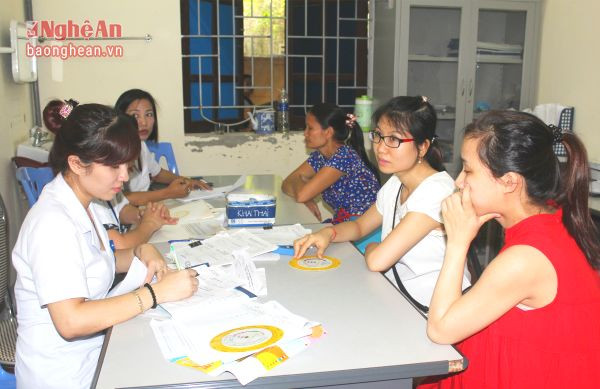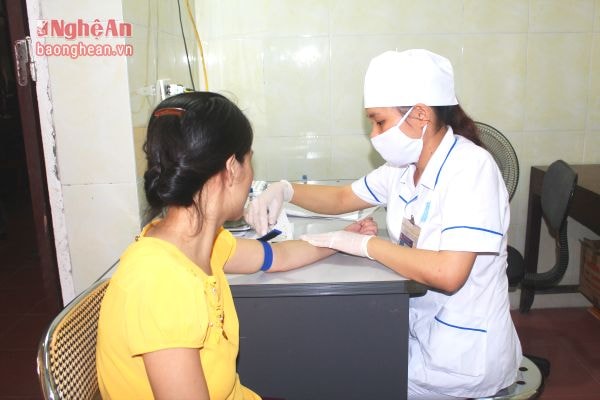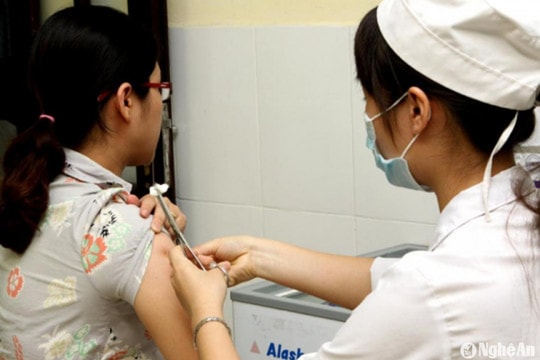Pregnant women should voluntarily test for HIV
(Baonghean) - Recently, the work of preventing HIV transmission from mother to child has been effective, raising awareness about preventing HIV infection for pregnant mothers.
After getting married and giving birth to her first son who is now 4 years old, and now pregnant with her second child, Ms. Ngan Thi Dung (Vinh City) is always proactive in having regular check-ups for the health of her fetus and proactively asking for HIV testing to prevent transmission from mother to child. Ms. Dung shared: “In my opinion, when getting married and pregnant, getting tested for HIV to prevent infection is very useful.
 |
| Pregnant women listen to medical staff advise on the importance of HIV screening blood tests. |
This is something that pregnant women should pay attention to and participate in, because it not only gives them a comfortable feeling knowing that their body and their baby are healthy, but also allows them to promptly treat the disease if they get sick to prevent transmission to their baby." Ms. Hoang Thi Linh in Nghi Phu commune (Vinh city) also said: "Getting tested for HIV to prevent mother-to-child transmission is very necessary and extremely important. Even though we have a healthy lifestyle, unfortunate incidents in life leading to HIV exposure are hard to predict."
Ms. Nguyen Thi Hoa - Head Nurse of the Antenatal Clinic, Provincial Center for Reproductive Health Care said: All pregnant women coming to medical facilities are encouraged to voluntarily test for HIV and are provided with care and treatment services to prevent mother-to-child transmission of HIV.
| According to statistics, mother-to-child transmission of HIV is the most common cause of HIV infection in children under 15 years old, and 99% of children infected with HIV are also from this cause. Currently, the Provincial Reproductive Health Care Center has tested 6,316 clients and patients for HIV, of which 6 cases were found to be HIV positive. These cases were all consulted by the Center's medical staff and referred to the Provincial HIV/AIDS Prevention Center for treatment. Therefore, testing to detect and treat infected pregnant mothers is very important. |
After having a positive HIV test result, it is necessary to provide the following issues: Counseling and psychological support to encourage the patient to feel secure, not to worry about affecting the pregnancy and the mother's health; counseling on pregnancy care, transmission risks and ways to intervene to prevent HIV transmission from mother to child; methods of care, treatment and raising the baby; counseling on family planning, condom use...
 |
| Medical staff take blood tests for pregnant women at the Provincial Center for Reproductive Health Care. |
Although the center has always paid attention to counseling and HIV screening to prevent mother-to-child transmission, many pregnant women have been detected and referred to the provincial HIV/AIDS Prevention Center for timely treatment. However, recently the program has encountered many difficulties and problems.
Dr. CKII Hoang Quoc Kieu - Deputy Director of the Provincial Center for Reproductive Health Care said: "The program to prevent HIV transmission from mother to child still faces many difficulties in examining and screening for HIV for pregnant women at the center. Because previously, since September 2008, the program was implemented from the funding source of the Provincial Center for HIV/AIDS Prevention and Control to provide free testing for pregnant women. However, by 2014, the funding source was no longer available, so pregnant women who wanted to be tested had to pay for it themselves.
| As of April 30, 2016, Nghe An has detected 8,242 cases of HIV infection, 4,982 cases of HIV infection are still alive and 3,260 cases of AIDS-related deaths. To date, Nghe An has 21/21 districts, cities and towns with 440/480 communes, wards and towns that have detected HIV-infected people. In the first 6 months of the year, 6,316 pregnant women were tested for HIV at the Provincial Center for Reproductive Health Care, of which 6 cases were found to be HIV positive. |
Besides, people's perception is that HIV is a disease somewhere, but they themselves will not get it because they think they have a pure life, husband and wife trust each other so they never go for HIV testing. And this is a voluntary test, so when consulting, they almost have no intention of participating.
The most difficult thing now is testing pregnant mothers in mountainous districts, where the roads are long and difficult to travel, and the rate of transmission through injections and unsafe sex is quite high... so screening for pregnant mothers is not high and they are not treated promptly.
In order for the prevention of mother-to-child HIV transmission to be effective, in the coming time, there needs to be close coordination between the Provincial HIV/AIDS Prevention Center and the Reproductive Health Care Center; there needs to be a policy of screening all pregnant mothers for timely detection for better treatment and management during pregnancy.
| Interventions for HIV-infected pregnant women during the antenatal, intrapartum and postnatal periods will also reduce the number of children born with HIV from their mothers, specifically: - Prenatal interventions: HIV testing counseling, screening and treatment of sexually transmitted diseases, vitamin and iron supplementation, prevention and treatment of opportunistic infections, use of ARV drugs to treat mothers or prevent HIV transmission from mother to child... are extremely necessary and effective measures to reduce the rate of HIV transmission from mother to child. - Interventions during childbirth: For women who have not yet accessed prenatal interventions, rapid HIV testing should be advised. If positive, ARV regimens should be used to prevent mother-to-child HIV transmission according to instructions. Interventions such as amniotomy, forceps, episiotomy, etc. should be considered for cesarean section and blood and lochia should be quickly cleaned from the newborn. - Postnatal intervention: Mainly counseling the mother about the benefits and risks of HIV transmission when breastfeeding. It is best to feed the baby with a milk substitute if possible. In cases where there are no conditions to use milk substitute, it is necessary to instruct the mother to breastfeed exclusively in the beginning, then wean early and switch to solid foods as soon as possible to reduce the risk of HIV transmission to the baby. In addition, the baby needs to be monitored and treated with ARV. |
Thuy Hien


